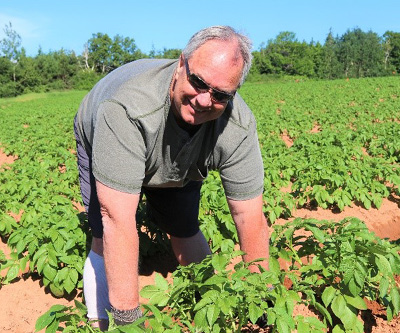
Canadian farmers are good stewards of the land and have long cared for the environment. They are on the front lines of climate change, and the first to feel its effects. To adapt to the new climate reality, Agriculture and Agri-Food Canada (AAFC) and farmers are working together to speed up the adoption of more environmentally friendly practices and technologies in order to protect the environment and continue to be leaders in sustainable agriculture.
This is the mantra behind Living Lab – Atlantic, a four-year research collaboration between AAFC, farmers and environmental organizations on Prince Edward Island that began in 2019. There are over 20 Prince Edward Island (PEI) farms along with dozens of scientists and technicians across Atlantic Canada participating in Living Lab – Atlantic. Their research is addressing several key areas impacting farmers, including soil health, water quality management and crop productivity. The farming practices they are studying and expertise gained will be shared with farmers across Canada to increase adoption.
This series of four articles takes you through the different Living Lab - Atlantic sites across Prince Edward Island to showcase the work farmers and scientists are doing to contribute to environmental sustainability in agriculture.

For our final stop, we head just east of Kensington, PEI, about 45 minutes west of Charlottetown towards the beautiful white sand beaches of the north shore. Steve Watts, owner of Genesis Crop Systems, is working with farmers, including Mull Na Beinne Farms Ltd., and AAFC scientists to research the use of slow-release nitrogen fertilizers as part of Living Lab – Atlantic. This type of fertilizer is relatively new to PEI farmers.
Nitrogen is found in fertilizers and helps plants to grow. However, sometimes potato crops don’t need as much nitrogen as the fertilizer provides to grow to maturity. This can result in the excess nitrogen entering soils and potentially contaminating groundwater.
“Like people, plants need food at optimum times instead of all at once. Slow-release nitrogen fertilizer allows the nitrogen to be released slowly as the plants need it over a period of time,” says Steve Watts.

“This ensures that the potato plants absorb all of the nitrogen in the fertilizer to prevent it from entering groundwater.”
Steve and scientists from the PEI Department of Agriculture and Land as well as the Dalhousie University Faculty of Agriculture are studying how well this fertilizer works in the weather and growing conditions of Atlantic Canada and also tracking water quality.
In the end, the project team hopes the use of this slow-release fertilizer in agriculture will help to ensure protection of clean water sources on PEI while enabling farmers to grow more quality potatoes.
Thanks for following our four article series on Living Lab – Atlantic.
Visit Living Lab – Atlantic for more information about the initiative.
Get more Agri-info
- Want more stories like this? Explore what else Agri-info has to offer.
- Interested in reporting on this story? Contact AAFC Media Relations at aafc.mediarelations-relationsmedias.aac@agr.gc.ca to arrange an interview with one of our experts.